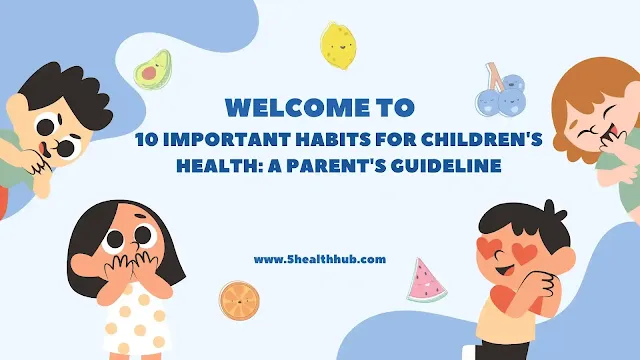1. Eat a Balanced Diet for kids health
The nutrients that support growth, development, and maintaining health in children need to be obtained from different sources. A right diet should get the appropriate mix of fruits, vegetables, whole grains, lean proteins, and dairy products. Fruits and vegetables contain vitamins, minerals, and fiber that the whole body need whereas whole grains offer sustained energy and fiber. The most basic building blocks of muscles are lean proteins like chicken, fish, beans and nuts. These help muscle growth and repair. Dairy products including milk, yogurt, and cheese, are calcium and vitamin D sources for strong teeth and bones.
2. Stay Hydrated for kids health
Water is key for the body to work optimally as children who are growing very fast as well as being very active. Proper hydration ensures temperature regulation, blood volume support, joint cushioning, and toxin flushing off from body. Throughout the day teachers should remind kids to drink water, most notably during exercise or hot weather conditions, to prevent dehydration and support the overall wellness of the child.
3. Get Regular Exercise for kids health
Physical activity plays an important role in both children's (a)physical health and (b)psychological well-being as well as their school performance. Routine physical activity helps to build muscle and strong bones, improve the heart’s performance, and increase coordination and balance. Additionally, exercise helps children keep a healthy weight, minimize stress and increase endorphin levels, which can uplift their moods. Promote many kinds of activities so your kids may keep an interest and stay motivated in it, whether it's riding bicycles, playing sports, doing swimming, dancing or just playing outside.
4. Limit Screen Time for kids health
Extensive screen time, such as TV and the internet, tablets and smartphones, is a major element that poses a threat to children's physical and mental well-being. Long-term sedentary life style is related with weight gain, bad sleep quality, loco motor problems and low academic achievements. Determine screen-time limitations and propose alternative activities consisting of reading, playing outside, drawing or painting, or playing board games, to promote physical activities, creativity, and social interaction.
5. Sleep Good enough for the Health of Your kids
Having good sleep quality is relevant to the physical and mental health of children. Sleep of recommended duration ensures sufficient growth function, immune stimulation and development of cognitive skills also including memory consolidation and learning. Establish a consistent bedtime routine and ensure children get the recommended amount of sleep for their age: 9 to 12 hours for school-age kids and 8 to 10 for adolescents. Set the maximum caffeine intake, create a suitable for sleep environment, and try to prevent devices’ usage before bedtime as ways to have good sleep.
6. Maintain Good Hygiene for the Health of kids
The only way to keep a childless spread of germs and disease is through teaching them good hygiene habits. Implement frequently handwashing with soap and water, especially before eating, whenever you use the bathroom, and after sneezing or coughing. Teach youngsters to cover their mouths and noses with the help of a tissue or their elbow when sneezing or coughing so that the likelihood of respiratory infections such as colds and flu can be reduced. Besides all that, provide other oral hygiene tips such as brushing teeth twice a day, bathing regularly, and keeping nails trimmed to ensure overall sanitation.
7. For the health of your kids, use sunscreen.
Protecting children's skin from the UV rays of the sun is vital to prevent the skin from burning, developing damage and eventually skin cancer. Apply broad-spectrum sunscreen with SPF 30 or higher to all exposed parts of the body such as face, neck, ears, and hands before going out. Re-apply sunscreen every two hours or more often if swimming or sweating. Advocate wearing protective clothing, hats, and sunglasses and seek shade during peak sun hours (10 am to 4 pm) to further lower sun exposure.
8. Promote kids' mentally and emotionally for their overall health
The emotional well-being of a child is as important as his or her physical health in nurturing the strength and sustainability of the child. Develop a family and school setting which enables children to feel cherished, cherished, and safe at home and in school. Promote open communication and active listening to enable children to express their feelings as well as deal with the challenges in a proper way. Teach coping methods like deep breathing, mindfulness and problem-solving to be able to cope with stress and anxiety. Build and maintain good relationships with both your family members, friends, and your peers which will give you a sense of belonging and connectedness.
9. Avoid your Kids consumption of processed and sugary foods.
Excessive ingestion of sweets, candies, soda drinks and highly processed foods may cause irreparable harm to the physical well-being of children. Most frequently, they are loaded with calories, sugar, unhealthy fats, and sodium, therefore they result in obesity, cavities, diabetes, and heart disease. Promote healthier snacking such as fruits, vegetables, nuts, yogurt, whole-grain crackers and cheese. Limit sugar-sweetened drinks and go for water, milk, or pure natural fruit juice moderately. Encourage children to participate in meal planning and cooking so that they can develop skills to make healthy choices and enjoy a variety of foods.
10. Promote Healthy Relationships for Kids Health
Creating quality bonds with family, friends, and peers, particularly in the first phase of life, is what generates a child's structure of emotional wellbeing. Healthy relationships bring support, encouragement and belonging which undoubtedly are fundamental for strong mental health. They mean having someone on your side, which is very important for your emotional stability. Highlight the importance of children speaking meaningfully, listening actively while empathizing, and resolving conflicts peacefully; such skills will have an overall positive effect on their interpersonal relations. Arrange different social setting for playing dates, additional activities and community involvement to assist children in a way they will gain experience in friendship, empathy and socializing.
Conclusion
Safety and health of infants are undoubtedly the most important factors that favor their transformation into confident, smart and happy personalities. Through the implementation of the ten outlined key habits in this article, the guardians can set a very strong basis for their children's physical, mental, and emotional assets.
One very helpful habit is to encourage children to eat a balanced diet and maintain normal physical activities, while the other healthy habit is to urge children to keep good hygiene and enjoy positive relationships with friends. Through this practice, parents show that these healthy habits are essential and have started it from the beginning of a child’s life that they should follow with practice. This will enhance children's in the choices to make out of the many options that are available till their whole lives.
Sometimes as we try to build a healthier and more resilient household, we might forget that it is consistency, patience, and encouragement that are our tools for the job. Every one of these just small steps of adopting these habits is the one towards the glowing, healthy future children are going to live in.
As a unit let us undertake an endeavor to look after children's wellness to enable them to reach the peak of their physical, mental and spiritual health. Through our commitment, as parents, we make all the difference in providing a foundation upon which our little ones can get the help to build thriving lives.



_11zon.webp)



